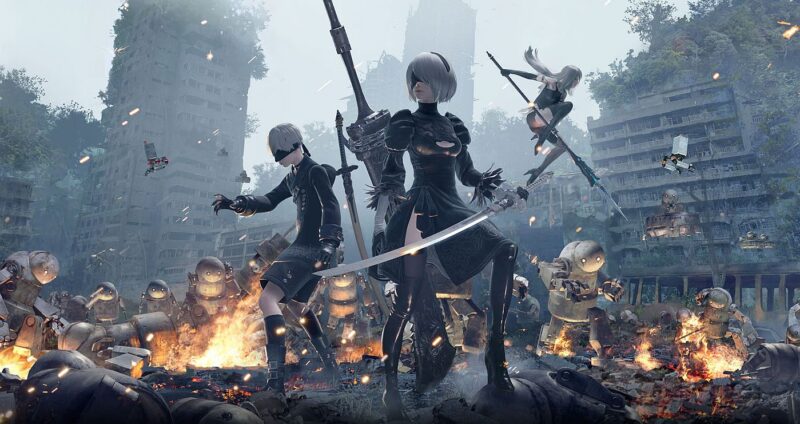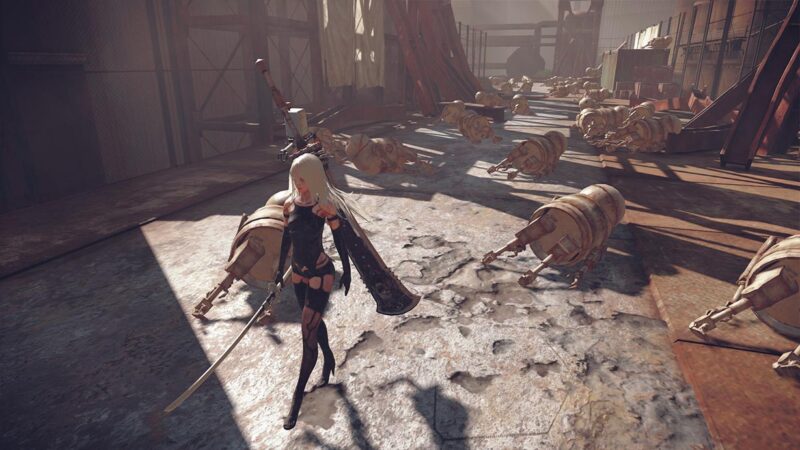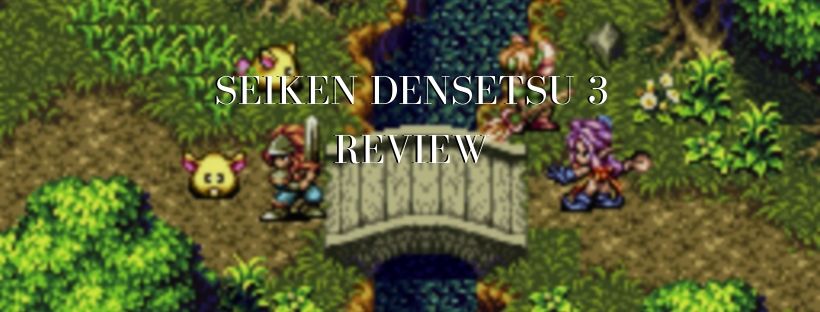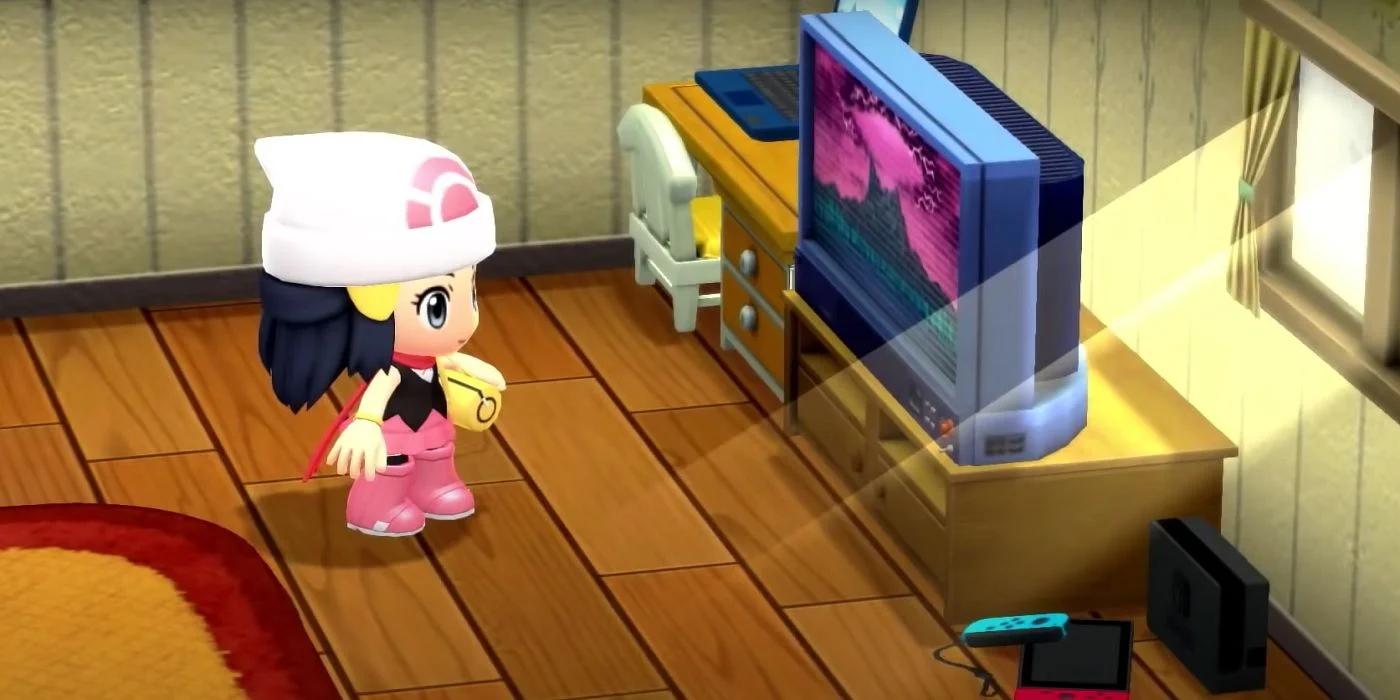
I’m an old school JRPG gamer. Final Fantasy VI and Chrono Trigger still remain at the top of my list. I’m not much on action rpgs. I prefer menu-based combat. But when Neir:Automata went on sale on Steam, I bought it.
It’s been a long time since an RPG grabbed me like Neir:Automata did.
As an action RPG, I found the game play enjoyable. I appreciated the motion sickness sensitivity settings for the camera. Many modern 3D games make me woozy. There’s plenty of gameplay reviews out there, so I will let you dig into them if you want more details on the play mechanics, customization system, and the like. I will add that I liked the plugin-chip upgrade system. I made a general purpose combat system that focused on health regeneration.
The atmosphere of the game grabbed me. It’s set in a dystopia overflowing with Ghost in the Shell references and themes. It deals with what it means to be human.You play as several androids, named 2B, 9S, and A2 as they fight against a race of robots that have conquered earth. You will encounter robots that resemble trash cans mimicking human behaviors, even down to simulating sex and rocking cradles with small robots within. Yet these trash cans open the question of consciousness. Are they just mimicking human behavior and speech? Do they really understand love? How much does behavior suggest a state of mind? Or the existence of a mind in the first place?

By using trash-can robots, Neir:Automata allows us to explore how violence intersects with these questions. You brutally murder them as they cry out in pain (is it pain?) or for their loved ones (can they love?). At the same time, you are an android, a machine as well. While the androids appear more human-like than the robots, you can’t help but wonder how much of their emotions are simulated too.
The game would play quite differently if it used flesh-and-blood characters. We are conditioned to assume behavior represents someone is mentally home. Yet we really don’t know this for sure. The only thoughts we can be aware of are our own. Nier:Automata plays around with this question just as Ghost in the Shell does. Even when you are connected to the thoughts of others, you can’t be certain those thoughts aren’t just a simulation, especially in a world sophisticated enough to produce self-conscious machines like 2B.

Nier:Automata‘s world teems with a sense of loss. The destruction of civilization offers an obvious example, but unlike the desolation of Breath of the Wild, this world isn’t abandoned. It is lost. It has lost meaning and hope. After all, for the androids death means nothing. Their consciousness and memories are continually uploaded back to the servers in a space station called the Bunker. They are then dropped back into a new body and sent back to the front lines. Sometimes memories fail to transfer. 2B often feels a sense of loss whenever this happens to 9S. They lose a shared moment that only happened because she happens to remember it. How many moments were lost because both of them couldn’t upload the memory in time?
Beside exploring the role of memory for personality, the game shows a loss of purpose. Most of the robots wander the ruins performing the same tasks they always had just because they had no other idea what else to do. A few break away to make a village, but their only recourse is to look toward the vanished humans for guidance. They turned toward history and human psychology.
The music emphasizes all of these themes (and others I can’t discuss without spoiling the story). Much of it features haunting, yet beautiful singing. The vocals show how humanity is missing from the story, both physically and metaphorically. Some of the game’s most terrible moments involve you murdering machines while a woman sings in the soundtrack. The music acts with the events and the world to weave together a sense of loss.
The Legend of Zelda: Breath of the Wild also achieved this sense of loss with its subtle music and long silences. Music glues together the visuals and actions of the player when handled well. Where Breath of the Wild remained subtle, Nier:Automata preferred flourishes. I enjoy both methods.

Video games offer a way of storytelling that can be visceral. Movies keep the audience at a distance. Books take away the reader’s autonomy and decision making. Video games allow players to make moral decisions that impact the world. Nier:Automata presents several cases of this that left me genuinely kerfuffled. As a player, you decide. You act. You drive the story. You kill. Whenever Nier:Automata presented me with a moral dilemma, to kill a robot or not, I felt the tension. I didn’t want to kill the robot, especially after it acted like a child. As a gamer, I like to experiment. As a person I abhor killing. And yes, I purposefully used the word kill instead of destroy. While the robot would reappear in a next play through, killing it would remove it from the current play through. Video games force you to make such moral decisions. The problem centers on how many gamers don’t see it as a moral decision.
After all, it’s just a video game.
Neir: Automata suggests our decisions are more than playing a video game. They can reflect who we are. Several times it pokes at the idea that digital decisions are not permanent. But our brains view video games, movies, and books as an experience. Experience shapes who we are. Whenever 9S loses his memory, he isn’t the same person to 2B. This reminds us about how important memories of experiences are for our personalities. Video games can indeed change us.
Nier: Automata remains with me. I’m still considering its themes and messages two years later. It explores the darker side of human psychology and of how the loss of civilization could change the world. I recommend you give it a play through.




I just restarted Nier: Automata after finishing with endings A, B, and C last summer.
It was a game that I found challenging, but a little boring and confusing on the first run through. But it definitely grew on me, and I do find it’s one of the best games on the PS4 generation.
The atmosphere and music are definite standouts.
Neir:Automata does have moments of “what do I do next?” but that’s a common problem with RPGs.
I actually got the Game of the YorHa edition a few months ago for my PS4 and went through all the endings. I think Nier: Automata is one of the best games of all-time. It’s a love-letter to video gaming and pays great homage to its genres. The OST is absolutely phenomenal work and probably the best OST of the 2010s’ decade. While it’s a very dark game, I can’t help but realize that there’s no way to get answers in life unless you move forward. That’s the whole point of Automata. I’ve read commentary from the creator Yoko Taro, who said fans who were suicidal have wrote letters telling him Automata gave them a reason to continue living.
Yes, the path is sometimes full of destruction (ie killing robots who may be more human than you are and the possibility of more questions than answers), but as the saying goes, destruction comes before creation. There’s so much I want to say about Automata because it left a great impression on me too. I wish more people played Automata.
Replicant v1.22 (the remaster of the prequel that takes place 1000 years before Automata) is coming out this week. I’m interested in exploring the lore as the main hero there is actually named Nier. From what I got from Automata and the references to Replicant in that game, the story is also very tragic. The story also has a more urban fantasy setting (no robots, but a story about magical monsters that plague the world).
The music is amazing. I rank it with Nobou Uematsu’s Final Fantasy VI scores. The best video games force you to think.